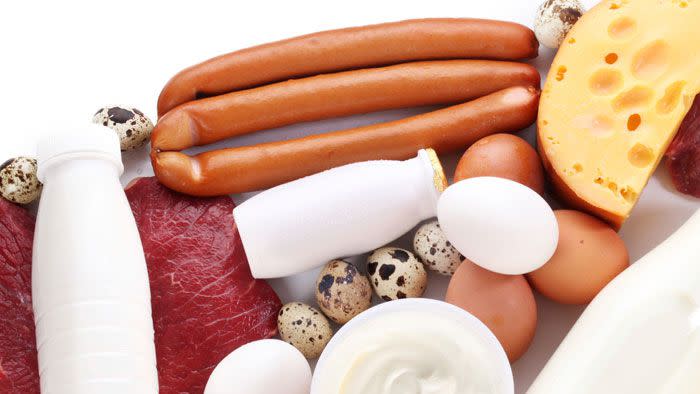Ask the Diet Doctor: Is Eating Too Much Protein a Waste?

Q: Is it true your body can only process so much protein at once?
A: No, it is not true. I have always found the idea that your body can only "use" a certain amount of protein funny, as what happens when you go over that number? Does it pass through your system undigested?
Protein and how much you need is a very misunderstood topic, most likely because we have traditionally looked at how much protein we need in our diets based on preventing a deficiency and not the optimal amount. If you are looking to ensure you get adequate levels of the essential amino acids, then you will need somewhere between 50 to 60 grams of protein each day. I know many nutrition professionals who believe taking in more than that is a waste.
But I'm going to bet that you are not reading SHAPE to help prevent nutritional deficiencies-you likely want to slim down, train harder, perform better, or all of the above. For this we need to look beyond deficiencies and look at what is optimal for building and rebuilding muscle. At its most basic level, for this to happen you need protein synthesis since protein is both the building blocks of muscle and the gas to ignite the process.
Researchers from the University of Texas wanted to figure out how you could optimize that process and if the timing of your protein mattered. They had one group of volunteers eat a high-protein (90-gram) meal at the end of the day and another space out protein intake across the day (30 grams per meal). Those who ate protein at every meal yielded the greatest net increases in protein synthesis.
So 30 grams seems to be the right amount to max out protein synthesis, meaning that if you had 40 grams of protein in one sitting (as found in most meal replacement shake packets), you won't see any more protein synthesis. But does that mean the extra 10 grams of protein goes to waste?
No, it just means it won't be used to further increase protein synthesis. But protein is not a one-trick macronutrient-it can also be used for other things. If you eat more protein above your muscle-building needs, your body will just break down the protein and its components and use it for energy. There are two benefits to eating more protein such that some could be used this way.
The first is the thermic effect of food. Protein is the most metabolically demanding micronutrient-some estimates show that it takes your body almost twice the calories to break down and use protein than it does carbohydrates.
Protein also elicits a different hormonal milieu than carbs, one more favorable to getting and staying lean. When you eat carbohydrates, the hormones insulin and glucagon are released. Insulin puts the brakes on fat release from fat cells and is used by your body to drive the amino acids from protein into your muscles. During this process, insulin also moves sugar (as you have a basal level of sugar in your bloodstream) into fat or muscle cells. This could result in low blood sugar (which can cause you to feel "off" or light-headed), so your body also releases glucagon, which has the primary job of taking stored sugar from your liver and moving it into your system so that you maintain even-keel blood sugar. Another bonus of glucagon is that it seems to also increase satiety, making your feel more full and satisfied. Glucagon may also stimulate your fat cells to release fat, but the details of this are still being figured out in humans.
While this may sound like academic musing about protein, it works out in real life as well. Weight-loss studies that include a higher-protein (about double the "prevent deficiency" recommendations) diet group show greater weight loss and better improvements in body composition. While there is a limit to the extent you can increase protein synthesis in one sitting, your body puts any extra protein to very good use.
